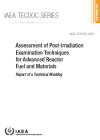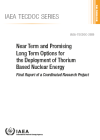The performance and reliability of nuclear fuel are very important factors to safely operate nuclear power plants. On the other hand, nuclear fuel also needs to be competitive, robust and able to operate efficiently and safely for long cycles.
Nuclear fuel development
Nuclear fuel must be adequately designed and manufactured to enable a reliable and safe operation of nuclear power plants. Nevertheless, in order for nuclear power generation to be sustainable, nuclear fuel cycle must remain economically viable and competitive, which can be achieved by optimizing the use of fissile materials in the reactor cores, e.g. by means of high burnup fuels as well as the recycling of plutonium and reprocessed uranium.
The safety requirements applied to the core materials of nuclear reactors are extremely high, which implies constant research and development at all stages of the implementation of nuclear power technologies. Additionally, the gradual introduction of innovative nuclear power technologies requires the application of modern sophisticated experimental techniques and advanced theoretical models for developing and perfecting nuclear fuels and core structural materials.
Member States, whether already operating nuclear reactors or embarking on nuclear power, place great importance on the harmonization and transfer of critical methodologies, as well as on quality control and on the certification and licensing procedures in power reactor fuel technologies.
The IAEA therefore assists its Member States with the improvement of their research and technological capabilities, enabling them to use, develop, design and manufacture reliable and economically viable fuel and core structures for nuclear power reactors. It also helps them utilize nuclear fuel more efficiently, by improving their understanding of the degradation mechanisms of fuel and structural materials in the reactors and of how to improve the predictive efficiency of fuel performance codes. This includes analysis of fuel behaviour under normal operating and accidental conditions, post-irradiation examinations, quality assurance and control, fuel modelling and computer code validation, economic and other aspects (e.g. environmental issues, relationship with back-end requirements).








